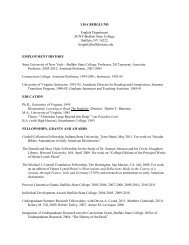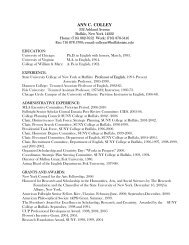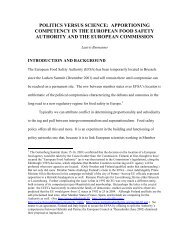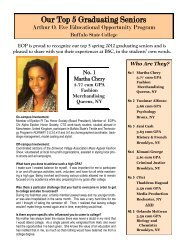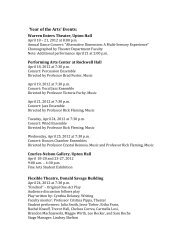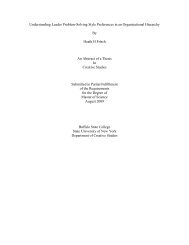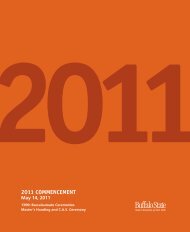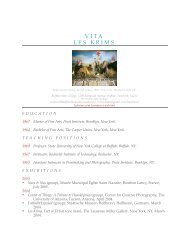Arts - Buffalo State College
Arts - Buffalo State College
Arts - Buffalo State College
You also want an ePaper? Increase the reach of your titles
YUMPU automatically turns print PDFs into web optimized ePapers that Google loves.
e re-evaluated. Conclusions for this project will be made based on<br />
the student’s progress.<br />
Presentation Type and Session: Poster III<br />
Seeing Reading Through a New<br />
Perspective: Sight Word Games<br />
Zachary Best, HON 400: All <strong>College</strong> Honors Colloquium<br />
Faculty Mentors: Professor Leslie Day, Elementary Education and<br />
Reading and Professor Andrea Guiati, Director, All <strong>College</strong> Honors<br />
Program<br />
Four students operating at frustration reading and<br />
comprehension level will increase their ability towards benchmark<br />
using sight word games. Testing of comprehension was done so by<br />
offering Dolch words to find proper assessment level. Given a below<br />
grade level passage, the students read at frustration level. Using<br />
Lev Vygotsky’s idea of scaffolding, 4 one-on-one teacher/student<br />
teams will exercise a multitude of games designed to work towards<br />
recognition of sight words. Increased recognition of Dolch words<br />
will directly allow these students to increase overall comprehension<br />
by use of context clues and other literary strategies. Giving focused<br />
attention to the students and implementing these strategies will<br />
engage and entertain the students. The candid learning will also<br />
allow him/her to relax and focus on reading in an authentic<br />
situation. A post-test following several sessions will allow the teachers<br />
to gage the increased ability of the student over their time together.<br />
At the end of the sessions, the students, if not benchmark, will at least<br />
have made substantial increases in fluency and comprehension. The<br />
post test, much like the pretest, will present a passage at grade level<br />
and will ask follow up questions to assess the level of comprehension.<br />
These questions come directly from the passage. This strategy does<br />
not follow many well-known reading and comprehension beliefs<br />
such as DIBELS. This strategy is also not curriculum based. Instead,<br />
this unique strategy will be innovative and play a role in future<br />
education and tutoring sessions.<br />
Presentation Type and Session: Poster III<br />
The Successful Advancement of First<br />
Generation African American <strong>College</strong><br />
Students<br />
Sonya Johnson, Early Childhood Education<br />
Faculty Mentor: Professor Myrtle Welch, Social and Psychological<br />
Foundations of Education<br />
This study addresses the importance of understanding which<br />
instructional tools promote academic achievement for firstgeneration<br />
African-American college students. For this qualitative<br />
study, nine freshmen and one junior first generation student in<br />
Bridge programs were interviewed one on one and asked about<br />
their experiences in school. Two of ten were males and eight were<br />
females. The theories, Model of Student Retention, Involvement<br />
Theory, Emancipatory View of Struggle, and Multiple Intelligences,<br />
Education<br />
ground this study. Using these theories, it is shown that with high<br />
means of post secondary academic support as well as parental<br />
support, these students can succeed. First-Generation students,<br />
who are the children of parents who never went to college, embrace<br />
the world of academia despite their unique challenges such as<br />
their low socioeconomic status and limited knowledge of their new<br />
collegiate environment. Most first-generation college students are<br />
retained on their post secondary pursuit or simply drop out by<br />
their second year in college. To embrace the “cultural uniqueness”<br />
of these “at risk students,” secondary and post secondary teachers<br />
and administrators, with instructional principles within a cultural<br />
responsive framework, can merge these students’ world of<br />
academics with the culture from which they grew up. In addition,<br />
these professionals can implement the importance of transitional<br />
programs that help keep them on a successful post secondary track.<br />
The Bridge Programs and the federally funded TRIO Programs’<br />
success rates are high in regard to First-Generation African<br />
American students’ success with post secondary endeavors.<br />
Presentation Type and Session: Oral – Education<br />
Teacher Candidates: Click Here! How To<br />
Make the Most of a PDS Website<br />
Stephen Malone, Elementary Education<br />
Faculty Mentor: Professor Leslie Day, Elementary Education and<br />
Reading<br />
<strong>Buffalo</strong> <strong>State</strong> <strong>College</strong> highly values the input and perspectives of<br />
its teacher candidates. In fact, each year, two undergraduate teacher<br />
candidates are chosen through an application process to serve<br />
on the PDS Advisory Council and participate in a variety of PDS<br />
initiatives. These undergraduate representatives provide updates to<br />
the <strong>Buffalo</strong> <strong>State</strong> <strong>College</strong> PDS Website enabling teacher candidates to<br />
obtain information about methods courses, student teaching, action<br />
research, and other <strong>Buffalo</strong> <strong>State</strong> <strong>College</strong> Education websites. To<br />
increase student accessibility, student representatives have created<br />
a “For Current Students” section on the PDS Website, and have<br />
launched a <strong>Buffalo</strong> <strong>State</strong> PDS Facebook page. The idea behind these<br />
new implementations is that teacher candidates from <strong>Buffalo</strong> <strong>State</strong><br />
<strong>College</strong> will build a sense of community in the world of professional<br />
development. Over the course of six months, data has been collected<br />
and analyzed to attest to the success of the <strong>Buffalo</strong> <strong>State</strong> PDS<br />
webpage and the new <strong>Buffalo</strong> <strong>State</strong> PDS Facebook page. In addition<br />
to the steps that have already been taken, “Teacher Candidates:<br />
Click Here!” also takes a look into the future of these web-based<br />
technologies. We hope that you will visit us on our website at www.<br />
buffalostate.edu/pds.<br />
Presentation Type and Session: Poster III<br />
69




